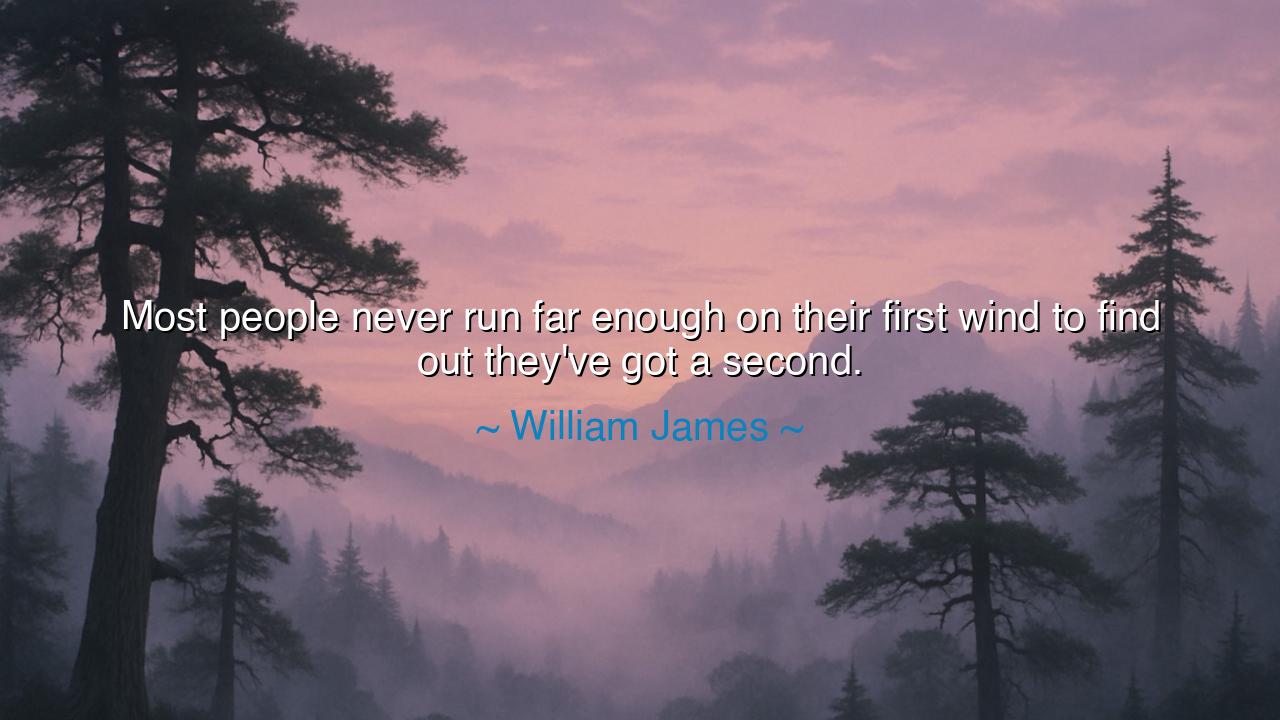
Most people never run far enough on their first wind to find out






In the annals of philosophy and psychology, where the mysteries of the mind and the spirit intertwine, William James, the great thinker of the American soul, uttered words that ring with both wisdom and challenge: “Most people never run far enough on their first wind to find out they’ve got a second.” In these words lies a truth about endurance, about hidden strength, and about the treasures that await those who dare to push beyond the threshold of weariness.
The first wind is the energy with which we begin—fresh, eager, and filled with promise. It carries us forward with enthusiasm, but soon it fades, and the body or the spirit cries out for rest. Most, hearing this cry, stop. They believe their strength is spent, that nothing remains. Yet James declares that beyond this moment of weakness lies the second wind—a deeper reserve of power, courage, and endurance that can only be discovered by those who persist. The tragedy is not that the second wind is rare, but that so few endure long enough to find it.
The ancients knew this truth well. Consider the legend of Pheidippides, the runner of Marathon. After carrying the desperate message of victory from the battlefield to Athens, he fell dead at his journey’s end. But before death claimed him, he discovered within himself a second wind, running farther than any thought possible. His triumph was not merely in speed but in perseverance, in pushing past the point where others would have surrendered. His act lives forever because he pressed into the hidden wellspring of endurance.
So too in the lives of the great. Abraham Lincoln, beaten down by political defeats, personal tragedy, and the weight of depression, might have quit a hundred times. His first wind was spent long before the presidency. Yet he pressed on, discovering within himself strength enough not only to rise, but to lead a nation through its darkest hour. His second wind, unseen and hard-won, became the salvation of millions. Such is the power James describes: strength hidden beyond despair.
James himself was not speaking only of running, but of the broader struggle of life. The second wind is not only of muscle but of spirit. It is the moment when the exhausted student suddenly breaks through into understanding, when the weary soldier finds courage anew, when the heartbroken soul discovers resilience they did not know they possessed. It is the hidden reservoir of the human condition, revealed only to those who press past the point of surrender.
The lesson is plain, yet demanding: do not stop when you are weary, for weariness is only the gate to greater strength. Push farther, endure longer, strive past the voice that says you are finished. For in that very moment, when you feel you have nothing left, you stand on the threshold of discovery. The second wind awaits those who refuse to stop.
So let the teaching of William James endure: “Most people never run far enough on their first wind to find out they’ve got a second.” Train yourself to press beyond comfort, to seek the hidden reserves of body and soul. Whether in the arena of sport, the labor of work, or the struggles of the heart, do not quit at the first sign of exhaustion. For beyond it lies a deeper strength, a new breath, a second wind—and it is there, in that place of endurance, that true greatness is found.






AAdministratorAdministrator
Welcome, honored guests. Please leave a comment, we will respond soon